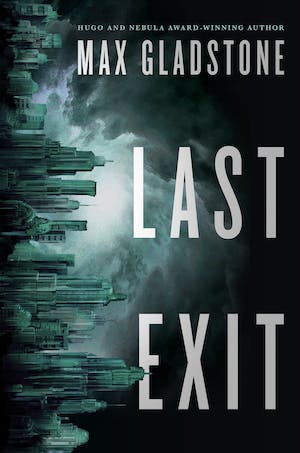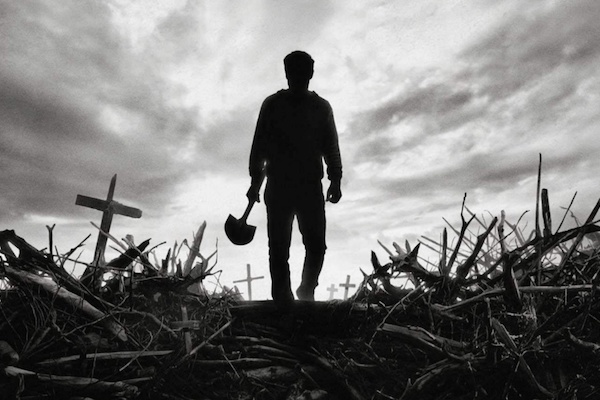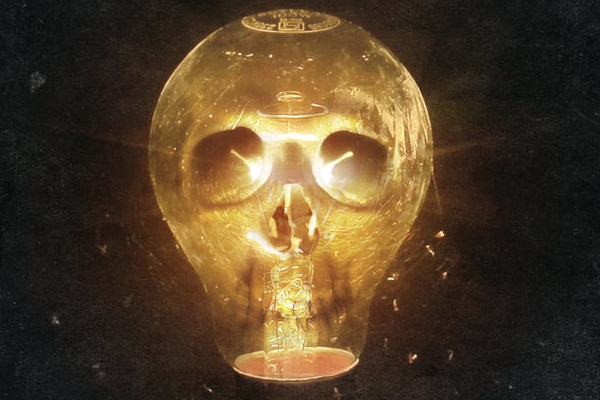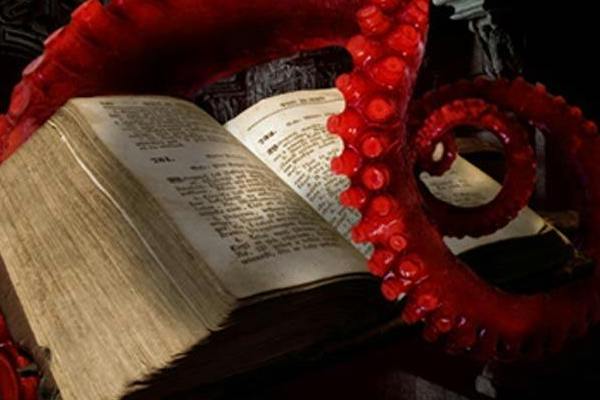Welcome back to Reading the Weird, in which we get girl cooties all over weird fiction, cosmic horror, and Lovecraftiana—from its historical roots through its most recent branches. This week, we continue Max Gladstone’s Last Exit with Chapters 21-22. The novel was first published in 2022. Spoilers ahead!
“Great dark wings swept through the storm, and from the racks, long, thin hands stretched down. They were singing.”
Zelda and Ramon make camp near the Medicine Wheel. They’ve decided to wait for the others, but Ramon continues to fret about what-ifs, “piling contingencies like firewood against the winter.” His knack tells him Ish, Sarah and June are still together; Zelda knows that doesn’t mean they’re okay. She knows, too, that no plans they contrive will make a difference. “The Medicine Wheel was not her place, not Ramon’s, not Sal’s or Sarah’s or Ish’s.”
Ramon retires to the Challenger, Zelda to the campfire. She stares up at the sky “bruised in the shape of Sal,” in which “cracks pulsed like an infected wound against the stars.” She’s watched Ramon’s sunlight wear down to “steel and leather, edge and crease.” She called him, and he came. She called them all, and “what a crime that was.”
She rises. The Wheel never changes, and it has a power no one they’ve met understands. Zelda survived entering it once, when she chased after Sal. This time the Wheel might crush her.
She has no right to ask her friends to brave the journey. They’ve grown, while she’s just “a tired woman beneath the stars.”
The Wheel whispers. Zelda steps over its edge.
* * *
Ish, Sarah and June camp in an abandoned amusement park. Ish leaves the others to follow his knack deeper into the place. June’s ability to summon rot still troubles him. He believes that knacks derive from one’s “damage.” He needs certainty, Sarah safety, Zelda escape. Maybe June just needs Sal.
Ish feels Sal everywhere, “behind the surface.” He remembers college and thinks that while Sal may have won Zelda’s heart, he and Zelda were closer in one way: “their fear had the same texture…[they knew] what it was like to be alone.” He wants to believe Zelda’s dream of changing the world, even knowing you can’t build a place “with people who still worked like people and expect it to turn out any better than history had.” With the walls between alts overstretched, he could find Sal now if he wanted. But he wants to hear from someone else.
He finds a video arcade, a tent full of blank-screened game cabinets covered with obscene graffiti and spiderwebs. Blood stains one pinball machine. A toddler-sized pink teddy bear lurks between cabinets. Young Ish longed for the kind of arcades he saw in movies, where outsiders could vindicate themselves via high scores, but he never found them. Deep in the tent he discovers a cabinet decorated with Old West scenes, with no controlling device but a holstered revolver too genuine-looking for a game. He rigs a power-pack from one of their robot horses to start the machine.
What appears on screen is a cowboy. The cowboy, eyes hidden under his white hat, mouth all teeth. He says Ish called him, and he’s ready to talk. Alternatively, Ish could run away, but that’s not how Ish works. Both he and the cowboy do what needs doing, what’s right. Now, Ish didn’t make the cowboy, who’s been around since the first European settlers came to America, but Ish helped wake him, creating millions of screens to serve as the cowboy’s eyes, eyes into which millions of people would stare. The cowboy’s the one who walks “the thin bright line,” the dream that justifies all the white boys who’ve ever “looked over the horizon and said, I’m gonna go out and kill me who’s over there and take what’s his.”
Ish understands that the cowboy wants to stop Sal, but if they share that goal, why has the cowboy tried to kill Ish and his friends? The cowboy counters: Is Ish’s “girl,” Zelda, on their side? Ish only sees a fantasy Zelda. What she wants, under the lies she tells herself, is to get “her lady back.” There’s no better world, nothing beyond the crossroads. Ish has seen that. He knows what has to happen to stop the rot. Both cowboy and Ish are “needful evils.”
The cowboy offers Ish the holstered revolver. What with Zelda being a beacon for Sal, and June calling her too, Ish will need all six bullets, which the cowboy’s made “from truth and certainty and the melted stars of lawmen.” Six bullets: for Sal, Sarah, June, Ramon, Zelda—and Ish.
A tornado-Sal appears in the game sky. Ish realizes Zelda must have entered the Wheel alone. The cowboy warns Ish to get moving before the Sal-storm arrives, then marches toward the tornado himself. The screen explodes, but the revolver remains.
Ish tries to convince himself that the cowboy’s just more rot, but he doesn’t speak in the rot’s voice. Unlike, say, the pink teddy bear that creeps up on Ish, exuding insect legs and dripping poison. Ish grabs the gun and shoots the horror.
Outside, thunder presages the storm. Ish tucks the gun in his pack and runs. (Five bullets left now. Who lives?)
In camp, June wakes from dreams of Sal, of climbing toward her on a tree endlessly tall. Sarah’s heard a gunshot. They’ll look for Ish if there’s time before the storm forces them to hitch. They prepare a robot horse. Ish rushes in, and reports Zelda has reached the Wheel. He replaces his robot horse’s power pack and leaps into the saddle.
Move now, and maybe they can catch Zelda in time.
Fighting the Cowboy: The Washington Post provides a rundown of the biggest good news stories from 2023. Highlights include a malaria vaccine, treatments for Sickle Cell Disease and postpartum depression, and a new treaty to protect oceans.
What’s Cyclopean: There’s something wrong with the creepy clowns depicted around that abandoned amusement park—wronger than most creepy clowns, I mean. “A rotten wind blew from the clown’s mouth, and ruffled the flags that were its teeth.”
Weirdbuilding: Ish has watched a lot of a certain sort of eighties teen movie, about kids “whose odd hobbies ended up saving the world or earning the affection of the Girl, which in that kind of movie was more or less the same thing.” Part of his head is still there.
Madness Takes Its Toll: The gang has talked to “sages… feather-cloaked witches… cackling, broke-toothed, mushroom-chewing madfolk” amid the alts, none of whom understand the power of the Medicine Wheel.
Ruthanna’s Commentary
This week’s theme is Bad Choices We Make When Left Alone for Five Minutes. Zelda gets into a spiral of how no one else should have to make these sacrifices—never mind that she already called the gang back to her and got them lost in the alts—and goes into the Medicine Wheel all by her lonesome. Ish wanders off in Creepy Clownland to talk to the Cowboy, and promptly gets silver-tongued into picking up the Magical Gun of American Mythohistory. Because no one else is strong enough to Walk The Line, so clearly he and the cowboy gotta do it. Here’s a tip: if someone tells you you’re a “needful evil,” maybe don’t go along with their plans.
Realizing that they couldn’t help splitting the party, this is one of many reasons why you never split the party. If you must, at least check your reflexive urges toward solo heroism with whoever came along with you. What’s that? You’re worried they might tell you to cut it the hell out? Huh, fancy that.
Ish believes knacks “reflect your damage.” To some extent I think he’s right; I also suspect that getting magical powers from your trauma responses does not pave a smooth road toward healing those responses. Ish can in one breath admit his need for certainty, and in the next be dead certain that he understands June’s psychology—and Zelda’s—perfectly. Here’s a tip: needing to feel certain doesn’t make your certainties correct. It’s maybe the one thing that the Cowboy is right about.
That’s not really fair. For the anthropomorphic personification of Lies Americans Tell Themselves To Feel Better About Genocide, the Cowboy has a surprising amount of self-awareness. Perhaps that balances Ish, who ignores all the self-aware things the Cowboy says in favor of somehow deciding that feeling better about genocide is a good idea. His kid—or the ancient power to whom he gave surveillance tech eyes—knows all his buttons. It’s the deadly appeal of being the one person rational enough to do the hard right thing (that regretfully involves sacrificing other people). It’s the fallacy of “The Cold Equations.”
The Cowboy claims that the alts aren’t possibilities, but nightmares. It’s Lovecraft all over, the conviction that Anglo-American civilization’s tenuous illusions are all that stand between humanity and Cannibals All The Way Down. If that’s true—the Cowboy quickly glosses over—then it’s not rot that causes clown-haunted amusement parks and Mad Max car gangs and plagues and heads on stakes. It’s just what privileged Americans believe would happen if they weren’t in charge. Also swiftly glossed over are the power and reality of actual alternatives. People really did run away from European settlements to join Native American communities, really did find better lives that way. Here’s a tip: if an entity was created to fight gods that hate “us” because of all that pesky genocide, maybe don’t go along with his plans.
But no, you’ve got to Walk The Line, because the alternative is the rot. The rot that whispers in “words on the edge of hearing in a language you’d forgotten since you dreamed childhood dreams.”
That doesn’t actually sound bad. Dangerous, maybe. Ish is wrong about June—she isn’t desperate for Sal, she’s desperate for change. Desperate enough, unlike a bunch of idealistic Yalies, not to flinch when she comes face to face with her desires. Desperate enough, willing enough, to climb the world-tree and see what’s beyond the top.
Just a little farther.
Anne’s Commentary
Was it really so long ago, Ish, that video games began to shoulder aside pinball and lure fresh crowds to communal dreams of conquest and the triumph of the underdog? There are those of us still alive who remember crowding around the early champions of each new game to see how the hell they were beating the program, or at least getting past the third or fourth wave that had most of us staring at GAME OVER and reaching for the next of too many quarters. Every payday I used to go through a whole roll of them being crushed by Centipedes, colliding with Ghosts, and watching my last Missile Base explode into pixelated fireballs. It wasn’t until I discovered Crystal Castles and Joust that I experienced the apotheosis young Ish craved, when “You could run up your score and people would see you, would understand that there was a point to you.” To be able to play on one quarter for hours or until your wrists gave out was also profoundly satisfying, and economical.
It really was a different thrill from rocking games on a home console or even in a MMORPG. I couldn’t say whether being a pro video gamer is more self-validating than being an old-time arcade superstar. I know I don’t get anything when watching a pro match close to the rush I got watching the first player at our local arcade defeat Dragon’s Lair. The cheers were so loud and long that, having earned them himself, Ish might have gone to Yale confident enough to have won Zelda before Sal did, or at least confident enough not to have let losing Zelda be such an enduring echo of trauma through his life. When Ish first thinks about “that Halloween disaster back in college,” I didn’t at first get what event he meant. It had to be something harrowing that happened in the alts, right? No, it was the Halloween party at which Zelda ran up to and kissed Sal, bursting Ish’s amatory bubble-dream. For him to have felt this revelation as a “disaster” at the time is understandable, but for him to apply such a strong term to it years later?
Sure, Ish could be using “disaster” in an ironic sense. Or he could be using it in an ironic sense meant, ironically, to mask the depth of his pain. See how complex are the inner lives Gladstone weaves for his characters. Chapters 21 and 22 both have an inward focus, first with Zelda, then with Ish. If cows ruminated as much as his people, they’d never get a meal digested. Which may be Gladstone’s point: Nobody in Last Exit has been able to digest what happened during their first round of alt-riding and pass out what couldn’t be assimilated. To queasily overextend the cow metaphor, Zelda and Ish have kept gnawing away in the pastures of rot and serpents, while Ramon and Sarah have crammed their alt-experiences into “stomachs” off the alimentary mainline, choosing to “forget” (more accurately, repress) rather than to fight on.
Ultimately, if you can neither assimilate or evacuate your intake, it being roughage too rough, you’re going to have a bellyache. If you have a bellyache, you’re going to bellyache about it. Then cue fraught interaction and/or violent action-action. That’s Gladstone’s pattern, and to be fair, often the natural rhythm of narrative.
The Chapter 21 “Zelda-internals” culminate in her guilt-ridden decision to walk the Medicine Wheel alone. Then one tiny paragraph of action: “She stepped over the edge.” Zelda’s kind of irritating me here. She’s dragged her friends out of their lives and through new alt-nightmares just to decide, wait, I’ll go after Sal solo, poor tired-woman-beneath-the-stars that I am. Not that it’s psychologically unrealistic for a human to act this way. As Ish ponders: While people still work as people do, you can’t expect them to build a good place, only one that’s screwed-up in a different way.
Rumination leads to more frenetic action in Chapter 22. First Ish confronts White-Hat Cowboy via vintage video game. The cowboy, he’s realized, is inimical toward Beyond-Sal. Does that mean this enemy of the alt-riders’ enemy can be their friend, or does it mean that the enemy of the cowboy must be the alt-riders’ friend? If the cowboy represents the reactionary “dream” of America, and by extension of humanity at large, what must Sal represent? Is her Storm the antidote to his Stasis? If rot can be safely weaponized, should Ish quell his doubts about June? With whom he can’t seem to avoid tussling, as the end of the chapter shows.
It’s established trope in weird fic that the more innocent a toy appears to be, the more likely it is Evil and murderous. What could be more innocent than a teddy bear? How about a pink teddy bear? Ish. How could you have turned your back on that stuffy from Hell?
Shoot teddy bears on sight and check for rot later: words to survive by in the alts.
Next week, Algernon Blackwood explores the fourth dimension in “A Victim of Higher Space.”














In my ebook copy, the last line of Ch 21 was all alone at the top of a page. When I turned to it, for the first time ever reading, I think, I audibly gasped. I’m with Anne in the respect that these people need to stop suffering for their past and start doing something, but that moment was built up so perfectly, and I need to know what’s going on past the Medical Wheel.
However, I also need Ish to get rid of those 5 bullets. They scare me very, very much.
@@@@@ Moderator the long reads also appear to have cut off into their own index.